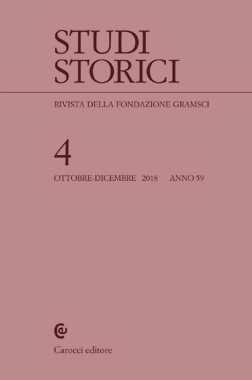
gennaio - marzo 2010 anno 51
Sommario e abstract degli articoli
Valerio Neri, pp. 5-52
Il lessico sociologico della tarda antichità: l’esempio delle «Variae» di Cassiodoro
The sociological lexicon of late antiquity: the example of Cassiodorus’ Variae
Starting from Cassiodorus’ Variae, the paper proposes to provide a systematic, though brief, analysis of the sociological lexicon of late antiquity in the variety of genres in which it is used (religious, literary, legal, etc.). In ancient culture, the sociological plane is intertwined with others (economic, ethical, political) and ancient society is represented as a series of binary oppositions (rich/poor, powerful/humble; aristocracy/common folk). The sociological level therefore cannot be isolated, but may be placed in a context in which it is primarily or secondary to other planes. A distinctive feature of the sociological lexicon in late antiquity is the influence of Christian vocabulary, especially in the characterization of the lower classes, although it interacts with the attitude of ancient culture and gives rise to expressions of censure and contempt, particularly with regard to crime.
Giuliana Vitale, pp. 53-72
«Universitates» e «officiales regii» in età aragonese nel Regno di Napoli: un rapporto difficile
«Universitates» and «officiales regii» during the Aragonese period in the Kingdom of Naples: a difficult relationship
Analysis of the various attitudes held by Universitates civium on the question of the appointments of the officiales chosen for them by the King invites reflection on the reasons prompting these choices. In fact, some elements, such as the geographical and social origin of the officiales, appear decisive. This essay does not follow the established historiographical interpretations based exclusively on the captain’s role within the power dialectics between King and University. Based on the documents examined, the conclusion is drawn that the various types of appeals to the King by the towns are to be related to the towns’ political assessment of the possible repercussions in terms of urban spaces of power being occupied by members of the local or the capital’s elite (who often belonged to powerful – and sometimes inter-town – clan-like aggregations) if they were to obtain control over key administrative and jurisdictional offices.
Corrado Vivanti, pp. 73-90
I «due governi del mondo» negli scritti di Sarpi
The «two world governments» in Sarpi’s writings
Despite disappointment with the compromise that, in 1607, ended the dispute with the Papacy over the Venetian Interdict, Sarpi was increasingly engaged in his activity as adviser to the Republic, in particular to defend its independence against political interference by the Holy See. In this setting, he had the idea of writing Della potestà de’ prencipi; left unfinished, a manuscript of his treatise has recently been found at Yale University, edited by Nina Cannizzaro. The work decidedly affirms the separation of the State’s government, subject only to princes, from spiritual government, subject to the Church. Both powers are taken directly from God, and are completely independent.
Pasquale Palmieri, pp. 91-111
Da Madrid al Purgatorio, da Cuba all’eternità. Un dialogo con Carlos Eire
From Madrid to Purgatory, from Cuba to eternity. A dialogue with Carlos Eire
Carlos Eire is the T. Lawrason Riggs Professor of History and Religious Studies at Yale University. He is interested in the social, intellectual, religious, and cultural history of late medieval and early modern Europe, with a strong spotlight on both the Protestant and Catholic Reformations, the history of popular piety and the history of death. His memoir of the Cuban Revolution, Waiting for Snow in Havana (which has been defined as «both an exorcism and an ode to a paradise lost»), despite having won the National Book Award for nonfiction in 2003 and being translated into many languages, is banned in Cuba. In this dialogue with Pasquale Palmieri, he focuses on the relations between his biographical and historiographic works, showing how his interests are strictly connected with the events of his childhood in Havana.
Monica Calabritto, pp. 113-135
«Furor» melanconico tra teoria e pratica legale
Melancholy «furor», between theory and legal practise
The essay focuses on the trial of Paolo Barbieri for the murder of his wife Isabella Caccianemici in Bologna in 1588. Doctors diagnosed the murderer as affected with «melancholic humours», which apparently led him to kill in a fit of madness. During the trial, witnesses defined Paolo’s behaviour with words ranging from «odd» to «melancholic» to «lunatic », while the defence lawyers for Paolo’s alleged accomplices presented arguments drawn from legal treatises and consilia dealing with the condition of furor, while trying to apply it to Paolo’s alleged «furor». A comparison of the witness’s and defendant’s depositions, and the judge’s questioning, with the textual tradition found in legal treatises and consilia, demonstrates the complex way legal practices in Bologna dealt with matters of madness.
Vincenzo Lavenia, pp. 137-154
Dare a Cesare quel che è di Cesare? Fiscalità e Chiesa cattolica in epoca moderna
Render unto Caesar the things which are Caesar’s? Taxes and the Catholic Church in modern times
Are Christians obliged to pay taxes? Do they commit a mortal sin if they evade taxes? At the end of the Middle Ages, as the capacity of individual sovereigns to collect taxes increased and the ancient patrimonial concept of taxation dwindled, Catholic moral theology started to question the relationship between conscience and human laws and between theological guilt and punishment. The question of tax fraud soon became an object of debate in casuistry, which was divided into two camps: one criticised the burden and injustice of secular taxes and encouraged confessors to pardon those who dodged them; the other insisted that paying taxes and obeying civic duties were undisputable necessities. This article analyses the debate, explains its rationale and traces its history into modern times.
Francesco Pezzini, pp. 155-208
Disciplina della sepoltura nella Napoli del Settecento. Note di ricerca
Burial regulations in eighteenth-century Naples. Research notes
Among all the revolutions that struck eighteenth-century Europe, this survey analyzes one that deeply changed the relationship with the deceased. The ban on burying in urban churches and the use of new cemeteries outside the city separated the space of the dead from that of the living. Enlightenment Reason only saw partial victory: burials were removed from the ecclesiastical monopoly, but the cult of the dead continued to be handled by the Church. This European burial reform showed special characteristics in the early period of the Bourbon Kingdom of Naples. In the populous Capital, modern cemeteries found it difficult to defeat the terresante, hypogea where corpses had long been handled and treated. Here, the Enlightenment death ethos was to challenge rituals going back to the concept of the «double burial» described by Robert Hertz in his famous Contribution.
Jesús Astigarraga, pp. 209-237
Ramón de Salas e le idee di riforma sociale nel tardo Illuminismo spagnolo
Ramón de Salas and the ideas of social reform in the late Spanish Enlightenment
The eighteenth century was without doubt a period in which Spain witnessed a period of relative modernisation. A late generation of enlightenment emerging during the 1780s and 1790s began to claim a set of wider and deeper reforms than those demanded by previous generations of the Spanish enlightened. This issue was particularly significant in economic and political spheres. Ramón de Salas’ work, still formally unpublished, is an illustrative example of this reformism. During the second half of the 1780s, as a distinguished Professor at the University of Salamanca, Salas penned an enormous work in which he carried out a wide-ranging and thoroughgoing criticism of A. Genovesi’s Lezioni di Commercio. This article overviews their profound differences on social issues.
Giovanna Canciullo, pp. 239-259
Accattoni. L’Albergo Ventimigliano di Catania tra idee, lessico e rappresentazioni
Beggars. Ventimiglia’s guest-house in Catania: ideas, lexicon, and representations
In the eighteenth century, Archbishop Salvatore Ventimiglia founded a guest-house in Catania to shelter local beggars – the disabled and the elderly in particular. The project aimed at dealing with the poverty spreading throughout the island, a result of both demographic increase and everlasting famine. The foundation was initially created to be a typical Ancien Régime hospice providing food and accommodation as well as relief and spiritual aid (confession and religious comfort). During the following century, the guest-house was to become an integral part of the territory: firstly, it ensured public safety and reduced wandering; secondly, it helped enhance the circulation of money, supplying credit to the local elite.
Note critiche
Sfoglia gli altri numeri dell’anno 51 / 2010
Elenco dei fascicoli pubblicati dal 2010
Seleziona fascicolo...
- anno 65 / 2024
- 1
- anno 64 / 2023
- 1
- 2
- 3
- 4
- anno 63 / 2022
- 1
- 2
- 3
- 4
- anno 62 / 2021
- 1
- 2
- 3
- 4
- anno 61 / 2020
- 1
- 2
- 3
- 4
- anno 60 / 2019
- 1
- 2
- 3
- 4
- anno 59 / 2018
- 1
- 2
- 3
- 4
- anno 58 / 2017
- 1
- 2
- 3
- 4
- anno 57 / 2016
- 1
- 2
- 3
- 4
- anno 56 / 2015
- 1
- 2
- 3
- 4
- anno 55 / 2014
- 1
- 2
- 3
- 4
- anno 54 / 2013
- 1
- 2
- 3
- 4
- anno 53 / 2012
- 1
- 2
- 3
- 4
- anno 52 / 2011
- 1
- 2
- 3
- 4
- anno 51 / 2010
- 1
- 2
- 3
- 4
